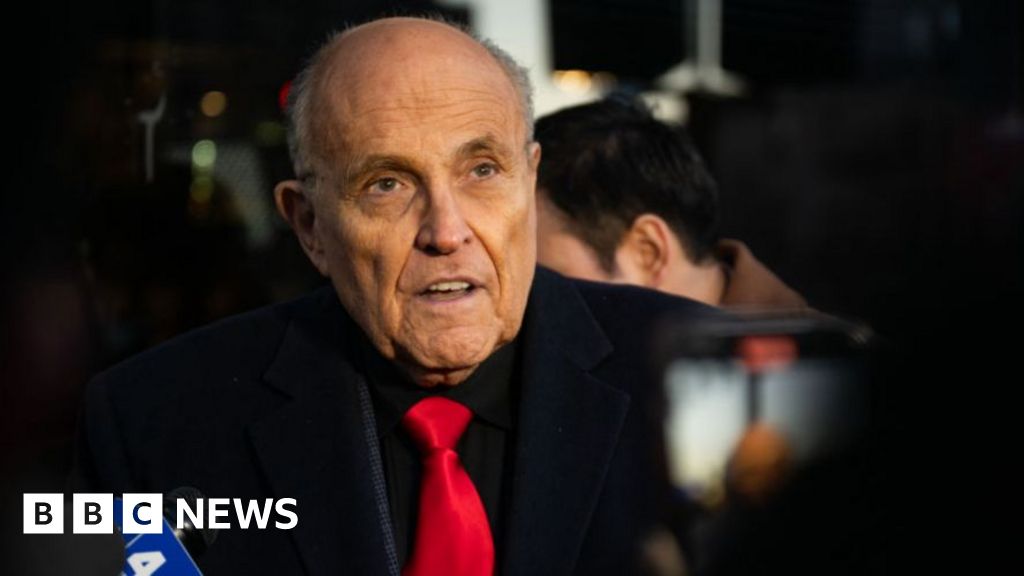BBC chair Samir Shah has apologised for an "error of judgement" over the editing of a clip of a speech by US President Donald Trump in a Panorama documentary broadcast last year.
In a letter to the Culture, Media and Sport Committee, Shah said more than 500 complaints had been made about the documentary since the publication of a memo last week that criticised the Panorama edit.
Shah's apology comes a day after BBC director general Tim Davie and CEO of BBC News Deborah Turness announced their resignations.
Read the letter in full below.
Cover Letter addressed to Caroline Dinenage, chair of the Culture, Media and Sport Committee
Dear Caroline,
Please see attached a letter to you and the Committee.
You will be aware of the resignation yesterday of both Director-General, Tim Davie and the CEO of BBC News, Deborah Turness. As I said in my statement yesterday, both have shown unwavering support and commitment to the BBC.
Tim Davie has been an exceptional Director-General and leader not just of the BBC but of the UK creative industries. He has led the BBC with great integrity, enormous talent and extraordinary resilience, transforming the BBC to serve all its audiences. Deborah Turness has been an outstanding leader of BBC News, who, during unprecedented times, has led the operation with real commitment and a clear vision of the future. I am immensely grateful to both Tim and Deborah for their service.
I and the BBC Board remain committed to doing everything we can to ensure a smooth transition as we appoint a new Director-General and strive to move forward to serve all our audiences and secure the BBC's future.
The BBC will be making both of these letters public.
Samir Shah
BBC Chair
Dear Caroline,
Thank you for your letter of 4 November.
I want to put on record the BBC's position on a number of issues that have been raised in the last week following the leak of a letter to the BBC Board from Michael Prescott, a former external advisor to the BBC's Editorial Guidelines and Standards Committee (EGSC). In doing so, I will also address the questions you asked me in your letter.
You asked for a copy of Mr Prescott's letter which I attach.
I want to make clear that we have taken Mr Prescott's concerns seriously, and considered the points he made carefully. The Board considered Mr Prescott's memo at a meeting on 17 October. I have since met with Mr Prescott and discussed next steps.
It is worth stating at the outset that some of the coverage of Mr Prescott's memo has implied that he has "uncovered" a list of stories and issues that the BBC have sought to "bury". That interpretation is simply not true. The issues raised by Mr Prescott are precisely the issues that have been considered by the EGSC and the Board. The EGSC is the senior forum in which we scrutinise BBC output when concerns have been raised (from either internal or external sources) and where we determine what action needs to be taken. Put simply: the Committee's job is to examine the bad news not the good news.
Sometimes the mistakes are one-offs, others may point to underlying problems. The job is never complete. But it is only by identifying and highlighting these issues and implementing changes that the BBC demonstrates its commitment to continuous improvement.
There is another view that has gained currency in the coverage that the BBC has done nothing to tackle these problems. That is also simply not true. Over the three years Mr Prescott was an advisor to the EGSC, the BBC has: published corrections where we have got things wrong; changed editorial guidance to make the BBC's position on issues clearer; made changes to leadership where the problems point to underlying issues; and carried out formal disciplinary measures.
During the three years Mr Prescott was an Advisor to the Committee, the BBC produced thousands of hours of outstanding journalism: on television, radio, online, nationally, regionally and internationally. This does not diminish the importance the BBC Board places on addressing the issues that Mr Prescott has raised. But it is also important that a sense of perspective is maintained.
Mr Prescott has relied upon research commissioned by the EGSC itself to make his points. This note, too, will rely on that research. However, Mr Prescott's memo is his personal account of the meetings at which he was present. It does not present a full picture of the discussions, decisions and actions that were taken. In answering the questions you have asked, I hope to put that right.
First, the EGSC accepts that there are occasions when the BBC gets things wrong or our reporting requires more context and explanation. This is the case in some of the issues mentioned in Mr Prescott's letter, where BBC executives fully accepted the conclusions of the EGSC commissioned research. These include the car insurance story, the insecure jobs item, the Scarlett Blake case, the ICJ order, and the reporting of casualty figures in Gaza. Action in these areas ranged from published corrections and clarifications to new editorial guidance being issued. In other cases considered by EGSC, disciplinary action has been taken.
On top of the specific stories, EGSC also identified concerns about underlying problems - for example in the Arabic service or long form journalism. These two areas have been discussed at length at the EGSC and action has been taken to tackle this kind of problem. The BBC Arabic Team has been restructured, a new Arabic speaking Head of Editorial Quality and Standards has been appointed in the World Service, and a new social media research unit has been set up to verify those who appear on the service. In the UK, BBC News have appointed a new Executive Editor of Editorial Quality and Standards to oversee domestic News output. BBC News will imminently appoint a new Director of News Documentaries and Long Form Journalism who will oversee current affairs output.
The changes in leadership set out above are a determined attempt to tackle the underlying problems identified by both the EGSC and in Mr Prescott's memo. Only by this action can we ensure that broader change not just the immediate correction of individual stories, is addressed. We will be monitoring closely: for example, this week, the EGSC will receive a planned update on BBC Arabic. But let me be absolutely clear here: if the problems persist, we will take further action.
What I have set out above are the actions that have followed EGSC discussion where the Committee agreed and reached a consensus view. Mr Prescott may have judged that these individual actions were not sufficient. That is his opinion - and it is of course for him to form that judgement. However, it is not true to say that concerns have been ignored or action not taken.
Michael Prescott's memo gives only a partial description of the evidence that EGSC received and considered.
For example, on the US election section, the EGSC did accept there was an issue with the Iowa poll but also noted that the BBC's overall polling coverage was "very good, particularly online".
And on the review of sex and gender identity, the EGSC noted much of the coverage met the BBC's standards of impartiality and accuracy.
Let me turn now to a specific story. The editing of President Trump's speech on January 6th in the Panorama, Trump: A Second Chance?
The editing of President Trump's speech on January 6th has attracted significant attention. This issue was the subject of discussion at EGSC in January 2025 and again in May 2025. There was concern expressed by members of the Committee, as well as Mr Prescott, of the way programme was edited. However, the EGSC also heard from BBC News that the purpose of editing the clip, was to convey the message of the speech made by President Trump so that Panorama's audience could better understand how it had been received by President Trump's supporters and what was happening on the ground at that time. This issue was considered and discussed as part of a wider review of the BBC's US Election coverage, commissioned by the Committee, rather than handled as a specific programme complaint, given it had not attracted significant audience feedback and had been transmitted before the US election, so the point wasn't pursued further at that time. The points raised in the review were relayed to the Panorama team, including the decision making on this edit. With hindsight, it would have been better to take more formal action.
Since the publication of Mr Prescott's memo, this issue has led to over 500 complaints. These are now being dealt with in the normal way. It has also prompted further reflection by the BBC. The conclusion of that deliberation is that we accept that the way the speech was edited did give the impression of a direct call for violent action. The BBC would like to apologise for that error of judgement.
You asked several questions around the high-level review of the effectiveness of EGSC. I instigated that review in June, well before Mr Prescott's memo. I have had several discussions as to how to improve the EGSC processes and the way it works, which has included input from Chris Saul's review work. That work has yet to conclude.
My intention is to sharpen and strengthen the process so that EGSC acts speedily, and monitors the actions agreed to ensure implementation. The plan is to broaden the agenda to include all BBC output - as all BBC programming, not just its journalism, is bound by editorial guidelines. I will also be changing the composition of the Committee to align better with its changed role and to ensure clearer accountability. This re-engineering of the EGSC will come before the Board in December.
In addition, I'd like to set out some additional actions:
- Going forward, the Board will commit to re-visiting, each and every item set out in Michael Prescott's note, and take further action where appropriate. We will be transparent about the conclusions we reach and the actions taken.
- Where we have put in measures already, in response to the original EGSC research, we will repeat those internal reviews to check the changes made are making material improvements to the output.
- Where we have already accepted that items fall short of our editorial standards, we will ensure that amendments to the relevant online stories are made where this was deemed appropriate.
I would like to assure you and the Committee that I am absolutely clear that the BBC must champion impartiality. It is more necessary now than ever before. All the policies and practices we have implemented so far, and will implement as we reshape the EGSC, will be driven by the need to hold the highest standards in all our content - video, audio and online.
As Chair I take responsibility for that. I hope this letter demonstrates that the BBC has taken significant action over the past three years. I will personally ensure that the BBC continues to take the necessary actions in the future to ensure the BBC retains the trust and confidence of the public we serve.
I'd like to conclude by restating the importance of high quality, independent journalism in today's polarised society. There is an increasing need for the public to be informed in a way that is impartial, truthful and is based on evidence they can trust. That is the sacred job of the BBC.
Samir Shah
BBC Chair
.png)
 3 hours ago
1
3 hours ago
1








 English (US) ·
English (US) ·